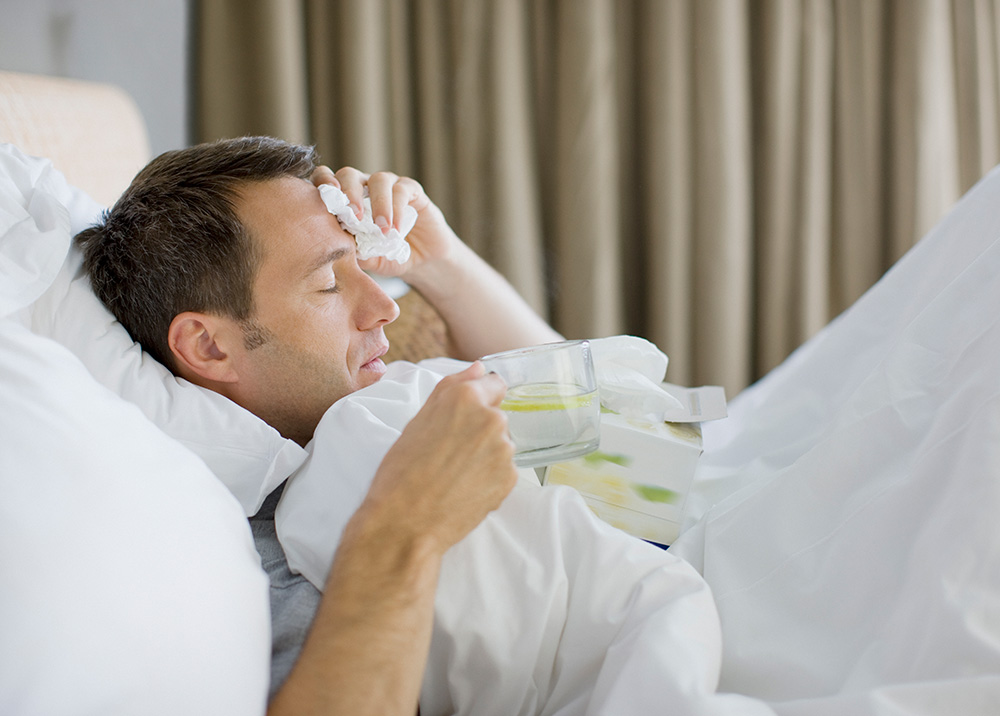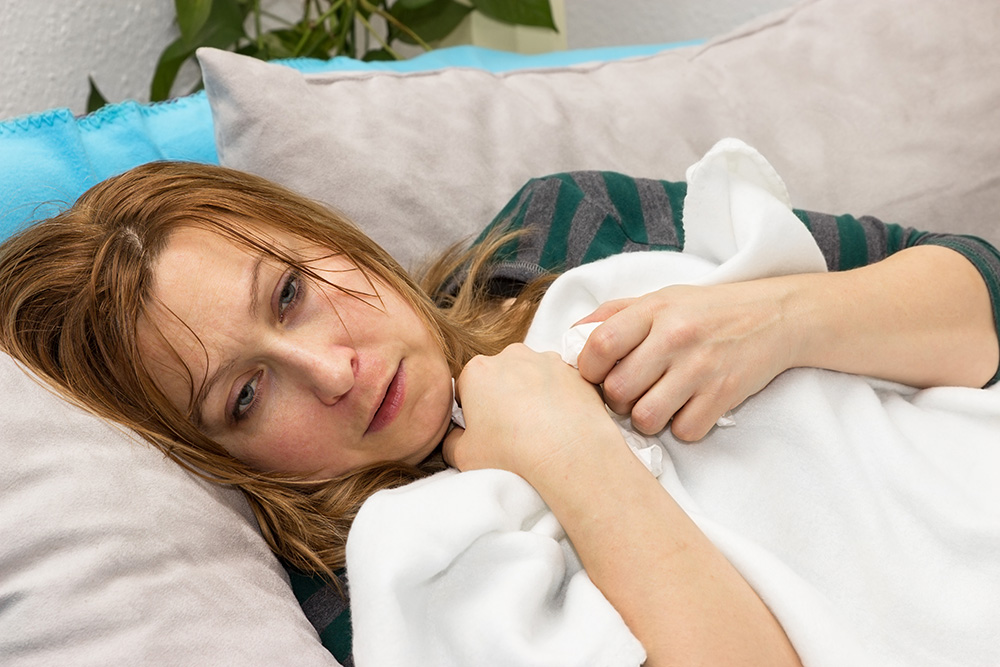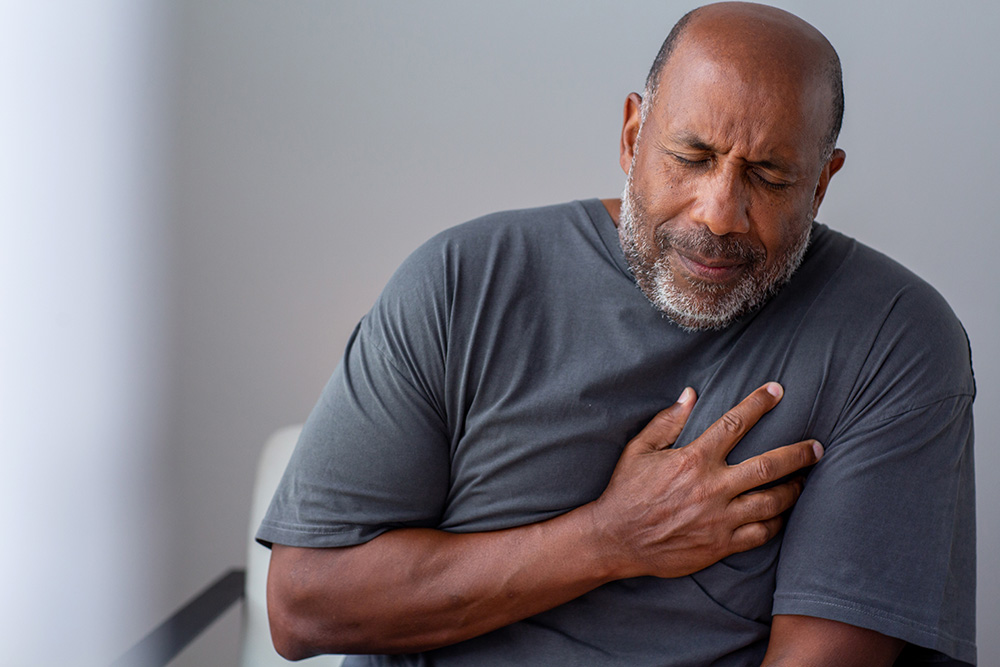If you wake up in a cold sweat, you’re not alone. There are many reasons people experience cold sweats. We’ll explore some potential causes of this phenomenon below.
What Are Cold Sweats?
The term cold sweats refers to episodes of sweating without a change in body temperature. Essentially, cold sweats are when you break out in a sweat despite your body not needing to cool itself off.
Many people sense a chill coming over them when cold sweats occur. Cold sweats most often happen in the palms, soles of the feet, and armpits.
As opposed to hot sweats, which occur when your body needs to cool down as a result of overheating, nothing external causes cold sweats. Instead, they result from a variety of physiological conditions. Some of these conditions are benign, while others are more dangerous, so it is important to consider what might be causing your cold sweats.

Cold Sweat vs Night Sweat
Cold sweats and night sweats both involve sweating that can ruin your night, but they are different phenomena.
Night sweats are severe sweating episodes that happen during the night, and the sweating can be all over your body. Either an underlying condition or an overly hot sleeping environment usually causes night sweats.
Cold sweats may happen during the day or night, with sweating typically concentrated to your palms, feet, and armpits. Cold sweats never happen because you’re overly hot, but due to a variety of underlying internal causes.
What Causes Cold Sweats While Sleeping?
Excessive nighttime worry can cause cold sweats while sleeping, as can physiological conditions that decrease the blood’s oxygenation. Read on to learn more about the conditions that can cause nighttime sweating, from shock to hypoglycemia.
Stress or Anxiety
One of the leading causes of cold sweats is the fight-or-flight response. This occurs when stress or anxiety tells your body it’s time to panic. When your body goes into fight-or-flight mode, the following physiological changes occur:
- Pupils dilate
- Blood sugar levels increase
- Digestion slows down
- Blood travels to your extremities (to prepare you to run or fight)
- Cold sweats occur (to cool your body down while you fight or flee)
While these things are helpful if you’re running from a tiger, they’re not so helpful when you’re trying to fall asleep. If your anxiety keeps you from sleeping, check out our article on anxiety and sleep for tips.
Nausea
Many things that cause nausea also cause cold sweats, so you may experience both simultaneously. Conditions that can lead to both nausea and cold sweats include motion sickness, food sickness, and pregnancy. Nausea can also be a symptom of more severe issues such as a heart attack.
Migraines
Migraines are severe headaches that come with a whole slew of other symptoms. One of these unfortunate symptoms is cold sweats. Other symptoms of migraine include:
- Severe pain, usually on one side of your head
- Blurry vision or double vision
- Heightened sensitivity to light and sound
- Nausea or vomiting
Sickness or Injury
Fever, infection, and sepsis are among the types of illnesses that cause cold sweats. Severe injuries like concussions and traumatic brain injuries can also be to blame.
It can be tough to sleep when you’re sick, and cold sweats only make matters worse. Once you’ve seen a doctor to rule out serious causes of cold sweats, check out our blog post on How to Sleep When You’re Sick for some help getting the rest you need.

Shock
Shock occurs when your brain and vital organs aren’t getting enough blood and, therefore, not enough oxygen. Many things can cause shock, such as severe infection (leading to septic shock), heatstroke, poisoning, and severe allergic reactions.
Regardless of the cause, shock requires urgent medical attention. According to the Mayo Clinic, some of the other symptoms of shock are:
- Rapid breathing
- Cool, clammy skin
- Rapid pulse
- Pale skin and bluish lips or nails (or gray in people with darker complexions)
- Dilated pupils
- Anxiousness
- Weakness
- Dizziness
Menopause or Pregnancy
When you’re going through extreme hormonal changes like those that occur during menopause or pregnancy, you can experience cold sweats. This is because your hypothalamus—the brain’s center for hormonal signaling and regulation—is in charge of hormone regulation and temperature control. So it’s no surprise that temperature control mechanisms like sweating can get a bit out of whack when your hormones fluctuate.
Medications
Hyperhidrosis, or excessive sweating with no physical cause, is a common side effect of various medications, including:
- Antidepressants (SSRIs, SNRIs)
- Diabetes medications
- Opioids
- Steroids
- Blood pressure medications
- Hormone replacement therapy.
Other Underlying Medical Conditions
Hypotension
We hear a lot about hypertension, or high blood pressure, but did you know your blood pressure can also be too low? Low blood pressure manifests in various ways, including having cold hands and feet. This is because less blood is being pumped into your extremities, which can also cause cold sweats in these areas.
If your blood pressure drops too low, it can be dangerous and lead to shock. Blurry vision, dizziness, nausea, and fainting are all signs that you should seek medical attention for your hypotension.
Hyperhidrosis
While hyperhidrosis is a side effect of some medications, it can also be a condition in and of itself. For example, if you notice that you break out sweating for seemingly no reason or sweat much more than other people, you may have hyperhidrosis. Hyperhidrosis can cause excessive hot sweats (sweating due to increased body temperature) and cold sweats.
Hypoglycemia
When your blood sugar levels dip too low, your body may react with cold sweats. This occurs most commonly in those with diabetes or prediabetes.
If hypoglycemia may be causing your cold sweats, please see a trusted medical professional. Johns Hopkins Medicine notes that other symptoms of hypoglycemia to watch out for include:
- Shaking or trembling
- Tachycardia (rapid heartbeat)
- Face flushing
- Dizziness
- Confusion
- Difficulty speaking
- Hunger
- Seizures
Hypoxia
Hypoxia happens when your organs are not getting enough oxygen. One of your brain’s responses to this low oxygenation is telling your body to sweat. You are at risk of hypoxia in environments with less oxygen than normal, such as in a smoky setting due to fire or at high altitudes.
Low blood oxygen levels can be very dangerous, so seek immediate medical attention if this may be the cause of your cold sweating.
Heart Attack
Some causes of cold sweats aren’t a huge deal, but some certainly are. Cold sweats are a common sign of a heart attack, and you should call 9-1-1 and seek immediate medical attention if you suspect you may be having a heart attack.
According to the Centers for Disease Control and Prevention, other symptoms of a heart attack to look out for include:
- Chest pain or pressure
- Jaw, back, or neck pain
- Feeling lightheaded, weak, or faint
- Shortness of breath
- Pain in one or both arms or shoulders

How to Stop Cold Sweats
To stop cold sweats, you need to address the underlying cause. Unlike sweating because you’re overheated, cold sweats are unrelated to the temperature of your environment. So if your cold sweats at night are ruining your sleep, talk to a trusted healthcare professional to figure out what’s going on and make a plan to address it.
Depending on what condition is to blame your cold sweats, there may be various remedies, including:
- Botox injections
- Antidepressants or antianxiety medication
- Meditation or other stress-relieving activities
- Prescription antiperspirants
- Nerve blockers, in the case of nerves erroneously signaling to your brain to sweat
When to Seek Medical Attention for Sweating in Your Sleep
Cold sweats can certainly be irritating, but how do you know if they’re also a sign of something dangerous?
As discussed above, cold sweats are not caused by external factors such as temperature. That means they’re always a symptom of something going on inside your body. Whether that warrants a trip to your primary care physician (or an emergency room) depends on the sweating severity along with what other symptoms you have.
If your cold sweats result from stress and anxiety, you may want to try meditation and relaxation techniques. Even something simple like writing in a gratitude journal before bed can help you wind down and alleviate stress before you sleep.
You should seek immediate medical attention if you experience:
- Symptoms of a heart attack, such as chest pain and shortness of breath
- Cold sweats following a head injury
- Symptoms of severe hypoglycemia, such as difficulty speaking and seizures
- Cold sweats that accompany shock symptoms, such as rapid breathing and heart rate, pale skin, and dizziness
- Severe hypotension symptoms such as blurred vision and fainting
If you have any concerns about the cause of your cold sweats, reach out to your primary care physician. Even if the underlying cause is not serious, cold sweats are indicative of something going on in your body, and it’s best to know what that is.
FAQs
Why am I sweating in my sleep but cold?
If you are sweating in your sleep for reasons other than heat, you’re experiencing cold sweats. These are caused by underlying medical conditions such as anxiety, infection, and hypotension.
Why do I sweat in my sleep when I’m sick?
When your body works through an illness, it often produces a fever in response to an infection. This increase in body temperature and blood flow near the skin can cause you to sweat in your sleep.
Why do my legs sweat at night?
Your legs likely sweat during the night because you’re hot. The temperature may be too warm, or your bedding or clothing could trap too much heat. Alternatively, you may sweat due to an underlying medical condition or side effect of a medication.
Why do I get cold and hot sweats while sleeping?
Cold sweats while you sleep are due to an underlying physiological cause, such as stress, illness, medication side effects, or a heart attack. Hot sweats occur alongside an increase in body temperature and result from internal or external factors, such as a hot room, fever, or menopause.
Why are my feet sweating but are cold?
When feet experience cold sweats, this is often related to poor circulation. If a part of the body is not getting enough oxygen, the brain often signals for that area to sweat. In this case, both the poor circulation and the evaporation of perspiration can cause your feet to feel cold.

